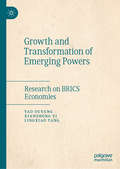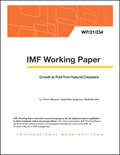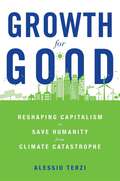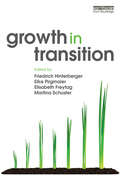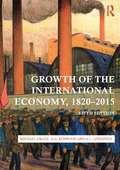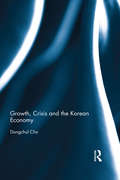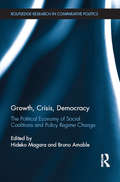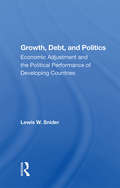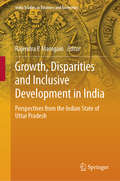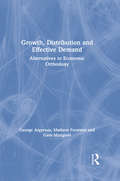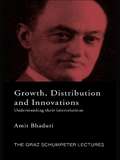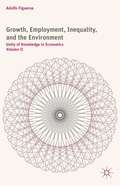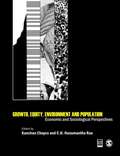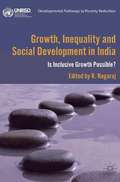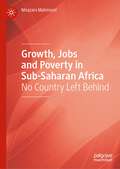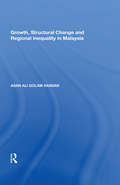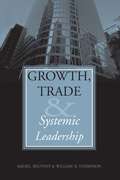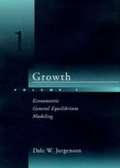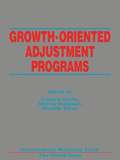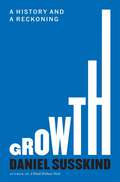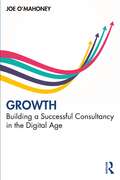- Table View
- List View
Growth and Transformation of Emerging Powers: Research on BRICS Economies
by Yao Ouyang Xianzhong Yi Lingxiao TangThis book offers a quantitative and qualitative look at the much-discussed BRICS—Brazil, Russia, India, China and South Africa—and explores how their economic ascent might cause global economic realignments in the 21st century. Providing a Chinese perspective on how the global realignment might impact strategic choices and a data-driven approach to the similarities and differences within the so-called BRICS group, this book will be of great interest to economists, international banking professionals, and political forecasters.
Growth at Risk from Natural Disasters (Imf Working Papers)
by Tamim Bayoumi, Saad Noor Quayyum, Sibabrata DasA report from the International Monetary Fund.
Growth for Good: Reshaping Capitalism to Save Humanity from Climate Catastrophe
by Alessio TerziFrom the front lines of economics and policymaking, a compelling case that economic growth is a force for good and a blueprint for enrolling it in the fight against climate change. Economic growth is wrecking the planet. It’s the engine driving climate change, pollution, and the shrinking of natural spaces. To save the environment, will we have to shrink the economy? Might this even lead to a better society, especially in rich nations, helping us break free from a pointless obsession with material wealth that only benefits the few? Alessio Terzi takes these legitimate questions as a starting point for a riveting journey into the socioeconomic, evolutionary, and cultural origins of our need for growth. It’s an imperative, he argues, that we abandon at our own risk. Terzi ranges across centuries and diverse civilizations to show that focus on economic expansion is deeply interwoven with the human quest for happiness, well-being, and self-determination. Growth, he argues, is underpinned by core principles and dynamics behind the West’s rise to affluence. These include the positivism of the Enlightenment, the acceleration of science and technology and, ultimately, progress itself. Today growth contributes to the stability of liberal democracy, the peaceful conduct of international relations, and the very way our society is organized through capitalism. Abandoning growth would not only prove impractical, but would also sow chaos, exacerbating conflict within and among societies. This does not mean we have to choose between chaos and environmental destruction. Growth for Good presents a credible agenda to enroll capitalism in the fight against climate catastrophe. With the right policies and the help of engaged citizens, pioneering nations can set in motion a global decarbonization wave and in parallel create good jobs and a better, greener, healthier world.
Growth in Transition
by Friedrich Hinterberger Elke Pirgmaier Elisabeth Freytag Martina SchusterStimulating growth through adjusting macroeconomic conditions remains the principal policy responses to pressing problems of unemployment, poverty and environmental degradation. However, are the current policy approaches capable of tackling these problems by generating win-win solutions or are they the root causes of these problems? The current growth trajectory has neither lead to a reduction of our overall resource use – as we use resources and energy more efficiently we consume more – nor create the conditions for employment and well-being. Increasingly, there is the realization that it is necessary to make substantial interventions into our national economies and create better framework conditions and incentive systems in order to more widely and rapidly develop and disseminate workable, innovative solutions for realizing sustainable development. This is the task of politics, and the concrete design of the measures must be built upon a broad public debate and shared long-term visions. The authors of this book intend to trigger a dialogue among stakeholders about how we can shape this transformation process towards sustainability. Following a detailed presentation of the key arguments for reconsidering the necessary conditions for sustainable economies, an international cast of commentators from politics, administration, civil society, business and science engage with the central question: is there an alternative trajectory for Western economies that sustains wellbeing whilst confronting ecological and social breakdown?
Growth of the International Economy, 1820-2015
by Michael Graff A. G. Kenwood A. L. LougheedKenwood and Lougheed’s classic book has been the benchmark introduction to the development of the global economy for decades. For this fifth edition, Michael Graff has brought the story up to date to include events from the early part of the twenty first century – continued globalization, the emergence of Asia as an economic power and the greater role played by business on the international scene. Beginning with the industrial revolution, the book charts the long nineteenth century, the impact of colonialism, the fast pace of technology growth and the impact of global wars. New features to this edition include: a prologue explaining the initial conditions faced by the world economy in 1820, detailing the beginnings of international trade and the influence of slavery greater coverage of developing countries increased coverage of World Wars I and II and of the twentieth century a number of appendices outlining the economic concepts and theories underlying the text This new edition of Growth of the International Economy provides the reader with a clear understanding of the factors which have been instrumental in creating the economic environment we face two hundred years after the industrial revolution.
Growth, Crisis and the Korean Economy
by Dongchul ChoSince the 2008 global financial crisis, policymakers as well as academicians have been seeking to fathom why subsequent recoveries remain tenuous. Other outstanding issues that they have been trying to understand include: why do some economies grow faster than others? How should the exchange rate volatility be understood and what factors make an economy more likely to fall into an exchange rate crisis? What policies need to be taken during tranquil periods, and how should they be changed once the crisis is triggered? As a partial effort to meet such interests, this book provides insights into these issues. This book examines growth and convergence (Part I), exchange rate volatility and the Asian crisis (Part II), and the global crisis (Part III). In addition, the book also draws lessons from South Korea's experiences - a country which has undergone three different crises and brisk recoveries (Part IV). The book also includes some practical and policy-oriented analysis. This is a truly comprehensive book bringing together varied topics and diversity under one common theme - economic growth and crisis.
Growth, Crisis, Democracy: The Political Economy of Social Coalitions and Policy Regime Change (Routledge Research in Comparative Politics)
by Hideko Magara and Bruno AmableSince the global financial crisis of 2008, advanced economies have been making various efforts to overcome the economic impasse. While the contrast between the countries that have escaped from the crisis relatively quickly and those still suffering from serious problems is becoming clearer, a new economic crisis stemming from newly emerging economies has again impacted advanced economies. In retrospect, both leftist and rightist governments in advanced economies pursued expansive macroeconomic and welfare policies from the post-WWII period to the oil shocks of the 1970s. While we recognise that the particular policy regime in this ‘Golden Decades’ during which the left and the right implemented similar policies cross-nationally, were characterised by outstanding economic growth in each country, the specific growth patterns varied across countries. Different social coalitions underpinned different growth models. This book is premised on tentative conclusions that Magara and her research collaborators have reached as a result of three years of study related to our previous project on economic crises and policy regimes. Recognising the need to analyse fluid and unstable situations, we have set up a new research design in which we emphasise political variables—whether political leaders and citizens can overcome the various weaknesses inherent in democracy and escape from an economic crisis by establishing an effective social coalition. A new policy regime can be stable only if it is supported by a sufficiently large coalition of social groups whose most important policy demands are satisfied within the new policy regime.
Growth, Debt, And Politics: Economic Adjustment And The Political Performance Of Developing Countries
by Lewis W. SniderThis book addresses the question of how political capacity of the government of a developing country affects its ability to implement structural adjustments in its economy in response to external pressures. It builds on the inductive foundation of comparative case studies and speculative insights.
Growth, Disparities and Inclusive Development in India: Perspectives from the Indian State of Uttar Pradesh (India Studies in Business and Economics)
by Rajendra P. MamgainThe book critically examines the high growth trajectory in India, particularly since the late 1980s, a period which is characterized by increasing inequality. Through various studies from the Indian state of Uttar Pradesh -- a state more populous than Brazil and with a GDP comparable to Bangladesh -- it sheds light on the link between growth and inequality in emerging economies. The slow pace of any upward movement in terms of various development indicators in low-income Indian states is due to a number of factors, including their historical disadvantages. Over a period of time, this has resulted in widening disparities, both between different regions of these states, and between these states and other more prosperous Indian states.The book provides a holistic, yet critical, region-wise analysis of the achievements of Uttar Pradesh compared to other states and to India as a whole, in the context of indicators of inclusive development, namely, growth, employment, poverty, infrastructure, agriculture, industry, education and health. Based on the latest data and sophisticated analysis methods, it assesses inequality and development disparities, clearly identifying three major challenges that poorer states face in redressing poverty and expanding inclusive growth – increasing economic opportunities, empowering poor and marginalised groups to avail new opportunities in a rapidly changing world, and ensuring an effective safety net to reduce vulnerability.The book suggests strategies for promoting high and sustained economic growth, and highlights the significance of broadening social inclusiveness through greater and more rapid access to economic and social opportunities, and building strong social safety nets to protect the chronically poor and mitigate their risks and vulnerabilities with the help of good governance and institutions. With contributions from leading scholars from the region, it is a valuable resource for researchers working in the area of growth and inequality, as well as for policy makers from developing economies around the globe.
Growth, Distribution and Effective Demand: Alternatives to Economic Orthodoxy
by George Argyrous Gary MongioviGrowth, Distribution, and Effective Demand presents original essays on a variety of topics in theoretical and applied economics. The book honors the work of Edward J. Nell and develops interconnected themes that run through the modern Post-Keynesian tradition. The first part deals with the fundamental idea that economic growth is demand-driven, with special attention to policy ramifications. The second theme concerns the connection between economic growth and the structural characteristics of a market economy. These issues are closely linked to a critical tradition that calls into question key elements in orthodox economics. The final part of the book aims to buttress non-orthodox approaches to growth and distribution by critiquing particular aspects of the conventional theory, by elaborating neglected themes in non-orthodox theory, or by exploring some overlooked methodological ideas.
Growth, Distribution and Innovations: Understanding their Interrelations (The\graz Schumpeter Lectures)
by Amit BhaduriIdea for those studying advanced macroeconomic and written by a widely published author, this book outlines a new and more fruitful way of understanding, analyzing and formally modelling economic growth.In his series of lectures, collected here in one concise and engaging book, Amit Bhaduri draws on contemporary issues such as the role of competiti
Growth, Employment, Inequality, And The Environment
by Adolfo FigueroaGrowth, Employment, Inequality, and the Environment deals with the fundamental economic problems of our time: employment, inequality, the environment, and quality of life. This exciting new volume is unique in that it is the first book of its kind in which these problems are analyzed using a unified theory framework. Figueroa achieves his goal by addressing two significant problems. First, to solve the epistemological challenges of building unity of knowledge, he presents a unified theory of capitalism. Second, he considers the epistemological problem of the role of theory in scientific knowledge. This book therefore deals with a consistent theoretical system. That having been said, these theories which contain logically correct propositions may turn out to be empirically false. In order to avoid this error, some rules of scientific knowledge are needed. Growth, Employment, Inequality, and the Environment presents a method that contains such rules. The method is derived from the Popperian epistemology, making it operational in economics. The proposed unified theory is therefore empirically valid; it is a good approximation of the real world. Theoretical economics is thus treated under explicit epistemological rules: theory is the servant, not the master.
Growth, Employment, Inequality, and the Environment
by Adolfo FigueroaGrowth, Employment, Inequality, and the Environment deals with the fundamental economic problems of our time: employment, inequality, the environment, and quality of life. This exciting new volume is unique in that it is the first book of its kind in which these problems are analyzed using a unified theory framework. Figueroa achieves his goal by addressing two significant problems. First, to solve the epistemological challenges of building unity of knowledge, he presents a unified theory of capitalism. Second, he considers the epistemological problem of the role of theory in scientific knowledge. This book therefore deals with a consistent theoretical system. That having been said, these theories which contain logically correct propositions may turn out to be empirically false. In order to avoid this error, some rules of scientific knowledge are needed. Growth, Employment, Inequality, and the Environment presents a method that contains such rules. The method is derived from the Popperian epistemology, making it operational in economics. The proposed unified theory is therefore empirically valid; it is a good approximation of the real world. Theoretical economics is thus treated under explicit epistemological rules: theory is the servant, not the master.
Growth, Equity, Environment and Population: Economic and Sociological Perspectives
by Kanchan Chopra C.H. Hanumantha RaoThe book brings together papers on a range of issues that are of relevance to the Indian economy and polity in the new millennium. The contributors examine issues relating to growth and macro-economic fundamentals, the state of and future prospects for industry and agriculture in an era of high growth and globalization. Growing regional disparities, gender issues and other forms of inequity dominate the analysis of health care, migration, fertility and mortality related issues. Contributors also analyse contentious issues at the interface of environment and development, such as environmental efficiency of industry, links between alternative notions of value and household use of biomass. In a complementary manner, sociological perspectives on religion, family, gender and state introduce into the volume a qualitative analysis of the social institutions within the framework of which economic growth and structural change take place.
Growth, Inequality and Social Development in India
by R. NagarajWith six essays exploring different aspects of economic growth, poverty, inequality and social security, this book offers a critical perspective on India's development experience since independence. Incisive and empirically rich, the book opens up new vistas in development discourse and informs current policy debates.
Growth, Jobs and Poverty in Sub-Saharan Africa: No Country Left Behind
by Moazam MahmoodSub-Saharan Africa (SSA) should not be defined by the structural parameters and opportunities of low-income countries, given that it also comprises a number of higher-income countries. This book finds that SSA is tightly constrained in its growth, employment and poverty outcomes. Rather than taking this as a conceptual downside, these constraints to growth and development have to be recognised and overcome—not just by a few countries able to escape them more easily, but by all countries in SSA, such that no country is left behind. The book observes a weakness in the quantum of growth in SSA. It relates this to a growth path based more on extractives than manufactured goods. While SSA is endowed with extractives, global demand for these is very volatile. These boom-bust cycles in export demand come to affect not just the export sector in SSA as a resource curse, but also the production of output of the entire economy. The book captures this through the working out of equilibrium in four major markets: the tradeables market, the domestic goods market, the labour market, and the money market.
Growth, Structural Change and Regional Inequality in Malaysia
by Asan Ali HassanEconomic development in the long run is seen as a process of structural change that is affected by economic growth. Malaysia is one of the middle-income economies that are going through rapid structural change. Since the mid 1980s it has changed to an industrially based economy with large-scale export of electrical and electronic components. However, thirty years after Malaysia's re-distributive policies have been exercised, regional inequality still exists. This book examines the nature and impact of regional policies in relation to the patterns of demographic and economic structural change and in relation to growth, distribution and income disparities across regions in Peninsular Malaysia. The book also explores the degree to which differences in regional manufacturing distribution and concentration have contributed to regional inequality. It concludes with a number of recommendations for regional policies that will reduce this inequality.
Growth, Trade, and Systemic Leadership
by Rafael Reuveny William R. ThompsonUsing a "lead economy" approach, Reuveny and Thompson link question about the global trade system to debates about hegemonic stability and the balance of power in world politics. By focusing on economic growth, protectionism, and trade, they surpass hegemonic stability interpretations of international politics to explain not only how hegemons maintain political order, but also the source of hegemonic/systemic leadership, the rise and decline of leadership over time, and the role of system leaders in generating worldwide economic growth and international political economic order. Rafael Reuveny is Associate Professor in the School of Public and Environmental Affairs at Indiana University. William R. Thompson is Professor of Political Science at Indiana University.
Growth, Volume 1: Econometric General Equilibrium Modeling
by Dale W. JorgensonVolume 1: Econometric General Equilibrium Modeling presents an econometric approach to general equilibrium modeling of the impact of economic policies.
Growth-Oriented Adjustment Programs
by Morris Goldstein Mohsin Khan Vittorio CorboA report from the International Monetary Fund.
Growth: A History and a Reckoning
by Daniel SusskindA vivid account of the past, present, and future of economic growth, showing how and why we must continue to pursue it while responding to the challenges it creates.Over the past two centuries, economic growth has freed billions from the struggle for subsistence and made our lives far healthier and longer. Yet prosperity has come at a price: environmental destruction, desolation of local cultures, the rise of vast inequalities and destabilizing technologies. Faced with such damage, many now claim that the only way forward is through “degrowth,” deliberately shrinking our economic footprint. But to abandon humanity’s progress would be folly. Instead, Daniel Susskind argues, we must keep growth but redirect it, making it better reflect what we truly value.In a sweeping analysis full of historical insight, Susskind shows how policymaking came to revolve around a single-minded quest for greater GDP. This is a surprisingly recent development: economic growth was barely discussed until the second half of the twentieth century. And our understanding of what drives it is more recent still. Only lately have we come to see how humankind emerged from its millennia of stagnation: through the sustained discovery of powerful and productive new ideas.This insight undermines the mantra that “we cannot have infinite growth on a finite planet,” for the world of ideas is infinitely vast. Yet growth’s critics are right to insist that we can no longer focus on its upsides alone. We must confront the tradeoffs, Susskind contends: sometimes, societies will have to deliberately pursue less growth for the sake of other goals. These will be moral decisions, not simply economic ones, demanding the engagement not just of politicians and experts but of all citizens.
Growth: Building a Successful Consultancy in the Digital Age
by Joe O'MahoneyNearly half of small consultancies fail within their first five years, but over 250 are sold every month. How do you ensure you are in the right group? How can you successfully grow a consulting firm? How do you maximise the value of your consultancy for an exit or investment? This is the first evidence-based book to tackle these questions. Based upon interviews with 72 founders who grew and sold their firms, two international surveys, and a long career researching and advising consultancies, Professor Joe O’Mahoney provides a detailed, evidence-based approach to successful growth and exit for consultancy leaders. Accessible, evidence-based and written by a leading expert in the field, this book is essential reading for anyone looking to set up, grow or sell their own consultancy business.
Große Fehler: Die besten Investoren und ihre schlechtesten Investments
by Michael BatnickInvestieren ist schwierig und oftmals eine demütigende Erfahrung. Auf dem Weg vom Amateurinvestor hin zu Warren Buffet wird es immer wieder Prellungen und blaue Flecken geben. In "Große Fehler" beschreibt Michael Batnick die Misserfolge einiger der größten Investoren aller Zeiten und erklärt deren daraus gewonnenen Erkenntnisse. Unterteilt in Kapitel werden Ihnen die Fehler von Warren Buffett, Bill Ackman, John Paulson, Benjamin Graham, John Meriwether, Jesse Livermore, Chris Sacca, Mark Twain, John Maynard Keynes, Jack Bogle, Michael Steinhardt, Jerry Tsai, Stanley Druckenmiller, Sequoia und Charlie Munger nähergebracht. Basierend auf umfangreichen Recherchen, beschreibt Michael Batnick die Tiefpunkte der größten Investoren. Es bleibt festzuhalten, dass es beim Investieren keine Abkürzungen gibt. Jeder, der schnell reich werden kann, kann auch schnell arm werden.
Großprojektmanagement
by Nicole GieseDas Buch beschreibt die Probleme und Gefahren, die im Großprojektmanagement auftreten können. So steht bei der Case Study die Betrachtung ethischer, moralischer und wirtschaftlicher Konflikte zwischen Unternehmen und Stakeholdern im Vordergrund. Am konkreten Beispiel der Projektplanungen für den Bau einer Mastanlage wird eine ethische Konfliktsituation dargestellt. Dabei wird aufgezeigt, wie Unternehmen im Spannungsfeld zwischen unterschiedlichen Stakeholdern wie Landwirten, Anwohnern, diversen politischen Parteien und sonstigen Interessenvertretungen agieren können und welche Probleme dabei möglicherweise auftreten. Die Case Study hilft Unternehmen bei der Identifikation möglicher Widerstandsfaktoren bei der Planung von größeren (Investitions-)Projekten. Insbesondere die Vermittlung von Unternehmenswerten steht dabei im Fokus. Die Kern-, Lehr- und Lerninhalte sind dabei ohne Weiteres regional und auf andere Unternehmen übertragbar.Die Leuphana Case Studies sind ein Projekt, das in Zusammenarbeit mit kleinen und mittelständischen Unternehmen erstellt und entwickelt worden ist. Sie sind ein Lehrbuch, mit dessen Hilfe Unternehmen, die vor ähnlichen Herausforderungen stehen, selbige bewältigen können. Dafür ist keine Hilfe von Dritten notwendig. Auf Grundlage der einzelnen Case Studies werden den Bearbeiterinnen und Bearbeitern elementare Werkzeuge aus der wissenschaftlichen Theorie erklärt. Diese können sie anwenden, um mit den Insiderkenntnissen des eigenen Unternehmens Prozesse zu optimieren, Ziele entwickeln und erreichen oder schwierige Herausforderungen zu bewältigen.
